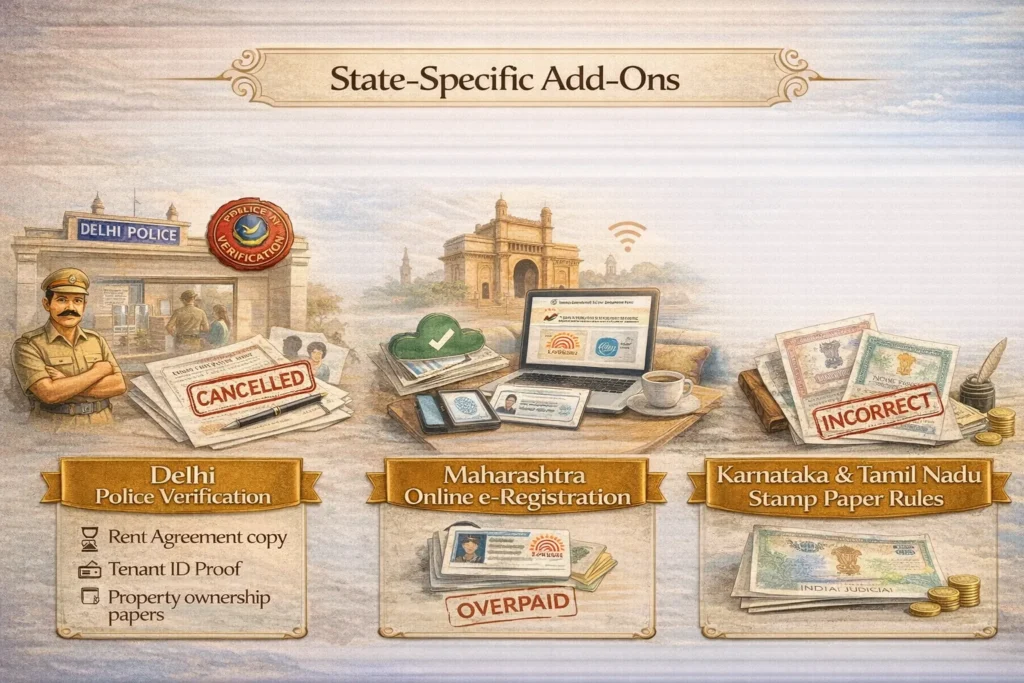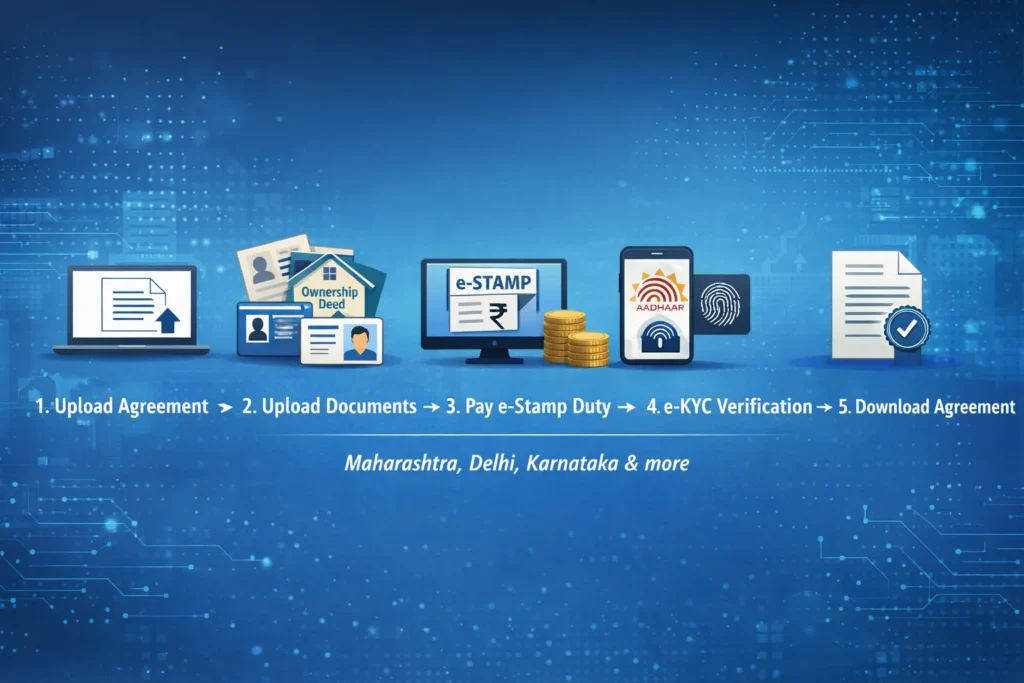
Mandatory Documents for Rent Agreements
You’re about to hand over your apartment keys to a tenant. They seem trustworthy. You take a token advance, shake hands, and think that’s enough. But later, if there’s a payment issue or damage dispute, how do you prove what was agreed?
That’s where rent agreement documents step in. They don’t just add paperwork. They protect landlords and tenants from sleepless nights, endless fights, and expensive court battles.
This guide is your all-in-one manual for rent agreement documents in India. We’ll cover what’s mandatory, what’s optional but smart, state-specific rules, and even what NRIs need. By the end, you’ll know exactly which papers to carry to the registrar’s office or upload online.
Why Rent Agreement Documentation Matters
A rent agreement is not just another sheet of paper. It’s a legal shield.
Without it, disputes turn into word-against-word battles. Courts won’t accept oral promises. A properly drafted and registered agreement, on the other hand, is valid evidence. It locks in the rights and duties of both sides.
Think of it like insurance. You may never need it. But if things go wrong, it’s the only thing that saves you.
In cities like Delhi, Mumbai, and Bangalore where rentals move fast, missing one document can stall registration or even make the agreement useless in court.
Landlord & Tenant Document Checklist
Here’s the part most people Google. What papers do I actually need? Let’s break it down in simple buckets.
Ownership & Property Evidence
The landlord must show they really own the place. Otherwise, how can they legally rent it?
- Title deed or sale deed – proves ownership.
- Index II (where applicable) – often used in Maharashtra.
- Latest property tax receipt – shows the property isn’t under dispute.
Identity Proofs
Both landlord and tenant must have valid photo IDs. Usually, one ID is enough, but many sub-registrars ask for two.
Accepted IDs include:
- Aadhaar card
- PAN card
- Passport
- Voter ID
- Driving Licence
Tip: If the tenant is a foreign national, their passport is mandatory.
Address Proofs
Address proof is needed separately for both landlord and tenant.
Valid proofs:
- Aadhaar card
- Passport
- Utility bill (not older than 3 months)
- Ration card
- Bank passbook
Photographs
Carry two passport-size photos each of landlord, tenant, and witnesses. Some states ask for duplicates to keep with both the registrar and police.
Income/Employment Proof (Tenant)
Not always mandatory. But many landlords ask for salary slips or a bank statement to confirm stability. This helps avoid tenants who default on rent.
Bank Details & Emergency Contacts (Landlord)
Today most tenants pay rent via NEFT or UPI. Including the landlord’s bank details in the agreement avoids confusion. Adding an emergency contact number also helps in urgent situations.
Witness Details
Two witnesses are compulsory for registration. They must bring:
- Valid photo ID
- Address proof
- Photographs
State-Specific Add-Ons

Rules change from state to state. Here are some unique twists.
Delhi-Police Verification Is Mandatory
In Delhi, landlords must submit tenant details to the local police station. Skipping this isn’t just careless, it’s risky. If a tenant gets into illegal activities, the landlord could also face trouble.
Documents usually needed:
- Rent agreement copy
- Tenant ID proof
- Property ownership papers
- Photographs
The process can be done offline at the police station or online through the Delhi Police website.
Maharashtra-Online e-Registration
Maharashtra made things simpler. Agreements up to 11 months can be registered online. Both landlord and tenant need Aadhaar and biometrics. Witness Aadhaar is also verified digitally.
No need to visit the sub-registrar. You can literally complete the entire agreement from your sofa.
Karnataka & Tamil Nadu – Stamp Paper Rules
These states still rely heavily on traditional stamp paper. The value depends on rent amount and duration. For example, Karnataka typically asks for stamp duty at 1% of annual rent. Tamil Nadu has fixed denominations.
NRI Rental Agreement Papers
If you’re an NRI landlord, there are a few extras.
- Ownership proof – title deed, tax receipts.
- Passport or OCI card – instead of Aadhaar.
- PAN card – often needed for tax purposes.
- Power of Attorney (PoA) – notarized and attested if you can’t be present.
- Embassy attestation – required in some cases for signatures made abroad.
These days, some states accept digital signatures via platforms like ZoopSign or DocuSign. Always check if your sub-registrar is updated.
Online Agreement Registration

Several states have shifted to online portals. Here’s how it usually works:
- Upload draft agreement with terms.
- Provide scanned copies of IDs, ownership proof, and photos.
- Pay stamp duty online via e-stamp.
- Complete e-KYC through Aadhaar OTP or biometrics.
- Download the digitally registered agreement.
States like Maharashtra, Delhi, and Karnataka have widely adopted this. Others are catching up.
What Happens If You Skip Registration?
Here’s the blunt truth. An unregistered agreement is useless in court.
Say your tenant refuses to vacate or stops paying rent. If the agreement is just notarized or worse, oral, you’ll struggle to prove anything.
Courts can also impound the document if proper stamp duty wasn’t paid. Penalty can be up to 10 times the deficit.
Saving a few hundred rupees upfront can cost lakhs later.
FAQs
Is Aadhaar mandatory for a rent agreement?
Not always. Passport, Voter ID, or DL can also work. But Aadhaar makes e-registration smoother.
Is NOC required in Delhi?
Not for regular rentals. But housing societies often ask for a No Objection Certificate before letting tenants move in.
Can NRIs register online?
Yes, in some states with e-registration. Otherwise, you’ll need a PoA holder in India.
What if police verification isn’t done?
It’s considered a legal lapse in Delhi. Landlords may be held responsible for tenant actions.
Why 11-month agreements?
Because anything over 12 months must be registered under the Registration Act. To save on fees, people prefer 11 months.
Who keeps the original agreement?
Usually the landlord, but both parties should keep at least a notarized or scanned copy.
Conclusion
Renting property in India isn’t just about finding the right tenant or landlord. It’s about covering yourself legally.
Carry the right documents. Register the agreement if the tenure is above 11 months. Do the police verification if you’re in Delhi. If you’re an NRI, prepare PoA papers early.
It may feel like a lot. But think of it this way. The cost of paperwork today is far less than the cost of a dispute tomorrow.
Pryank Agrawal is the Founder and CEO of Housewise, a leading property management startup serving customers across 45 countries with operations in 22 Indian cities, including Pune, Bengaluru, Hyderabad, Chennai, Delhi NCR, and Mumbai. An engineering graduate from IIT Roorkee, Pryank brings extensive experience from the software industry. His passion for leveraging technology to solve real estate challenges led him to establish Housewise, simplifying property management for homeowners worldwide. After persistent requests from existing customers to address other challenges faced by Non-Resident Indians, he founded MostlyNRI, a dedicated portal assisting NRIs with taxation and financial asset management in India.
